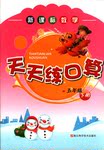题目内容
As you are working, keep your eyes on your own test booklet(小册子) and answer document (答题卷). If you have a question, raise your hand, but do not look around. If you are involved in any of the actions listed below, you will be dismissed (让...离开) and your answer document will not be scored. Prohibited (禁止的) behaviors include:
▲ continuing to write after time is called on each test (You must put your pencil down when time is called.)
▲ looking at another student’s test booklet or answer document.
▲ using any device to share or exchange information at any time during testing or during the break (all electronic devices, including mobile phones and MP4s, must be turned off from the time you are allowed to test until you are disissed after testing.)
▲ trying to remove test materials, including questions or answers, from the test room.
▲ not following instructions by the rules (规则) of the test center.
▲ allowing a clock or mobile phone to sound in the test room.
If you finish before time is called, review your work on the test you have just finished. If you are satisfied (满意的) with your answers, place your answer document inside your test booklet and close the cover. Sit quietly until the teacher gives you further instructions.
You will have two tests in the morning and a short break between the tests. Do not leave the building during the break. You must ask permission (允许) to leave the room during testing to go to the restroom; you will not be allowed(允许)to make up (弥补) the time you miss.
You will be required (要求) to sit quietly until you are dismissed. After all answer documents and test booklets have been collected, the teacher will dismiss you.
( ) 10. The passage is written mainly about ___________.
A. the importance of the test B. the rules of the test
C. the functions of the test D. the results of the test
( ) 11. If a student uses his mobile phone during the break, he will _______.
A.be dismissed and get no score at all
B.be asked to turn it off and continue testing.
C.be asked to stay in the rest room for a long time.
D.be ordered to remove the test materials from the test room.
( ) 12. When a student finishes testing before time is called, the right order of what to dot is ____________.
① close the cover
② review the work on the test
③ place the answer document inside the test booklet
④ sit quietly until the teacher tells you what to do next
A. ②①③④ B. ④②①③ C. ②③①④ D. ③②④①
( ) 13. Which of the following is TRUE according to the passage?
A.Clocks can sound to tell students time during testing.
B.Students can walk out of the building during the break.
C.It’s possible for students to make up the time they miss.
D.Students can’t go to the restroom during testing without permission.

【解析】略

 天天练口算系列答案
天天练口算系列答案You have probably heard it before, most likely from your English teacher. If you want to become a good writer, read good writing. Unluckily, you may not have understood what did good to you and even what you were supposed to get from that experience.
As you start reading a book, poem, or story, do so with no thought at all and the experience will improve your writing. Just read for pleasure to begin with, or to learn. As you progress through the work, think about whether it is “easy” reading or not. Do you become so interested in the subject and flow of the writing that you completely forget the person who wrote it, or does the composition sometimes call too much attention to itself through words and phrases that seem out of place or unexpected? The second situation is a chance to learn from the writer’s mistakes. In fact, the reader should not have to worry about how a writer does “his thing” ... he should be able to just enjoy and learn. Every time a word strikes you as poorly chosen, stop to consider why it has this effect. Also, do not spend a lot of time analyzing (分析) the passage but put more efforts in enjoying it from the whole.
Another thing I do, particularly with nonfiction (非小说) books, is to select a part to read as if it is a completely separate work. Once again, read as a common reader rather than a critic (批评家). For learning how words and phrases work together on the most basic level, however, nothing is more suitable than devoting yourself to reading poems. A poet is often trying to put a book’s worth of meaning and feelings into lines, and every side of the work shows a very close attention to craft (工艺).
As you can see, there is no simple way of reading to improve your writing. The key is not to make it boring. Select writers you admire or like most, and enjoy their works as anyone else would. As long as you are reading, you are improving yourself as a writer.
|
Improving Your Writing by Reading |
|
|
Facts |
Ø Reading good writing 1. you become a good writer. Ø You don’t understand the 2. of reading and what to get from reading. |
|
Ways |
Ø Read not to learn but for 3. . 1) Develop a great 4. in the subject and flow of the writing. 2) Learn from the writer’s 5. if possible. 3) 6. shouldn’t be spent in analyzing the passage but in enjoying the passage from the whole. |
|
Ø Read as a common consumer rather than a critic. Ø 7. yourself to reading poems and enjoy the lines. |
|
|
Conclusions |
Ø Don’t make yourself 8. with reading. Ø Select your 9. writers and enjoy their works. Ø You are sure to make 10. during reading. |